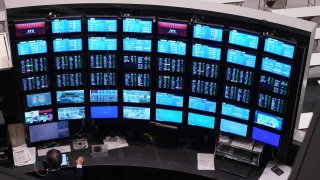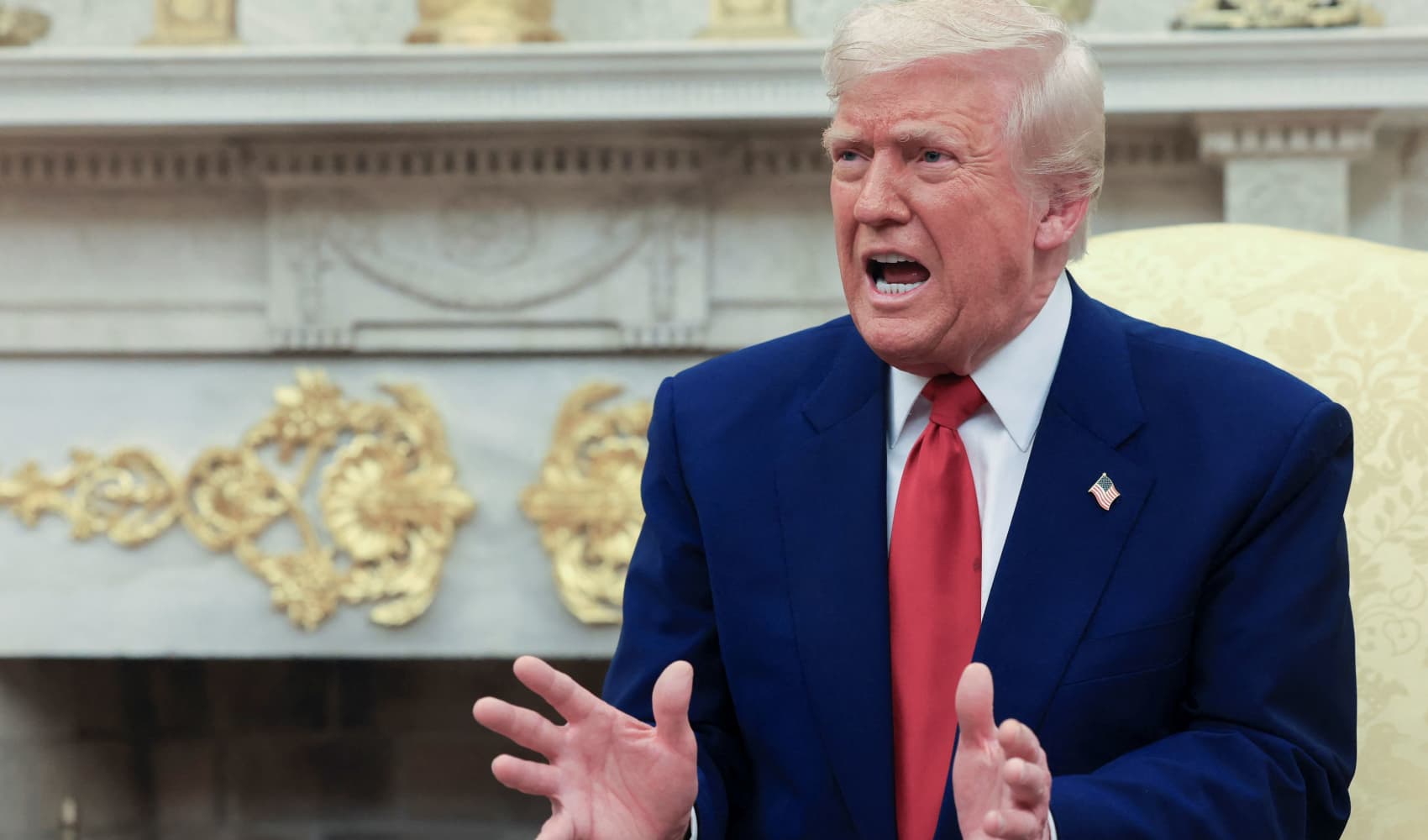
An employee works at the Tokyo Stock Exchange in Tokyo, Japan, on Jan. 13, 2022.
This is CNBC's live blog covering updates on Asia-Pacific markets.
Asia-Pacific markets are trading lower across the board on Thursday after the latest Wall Street rally cooled overnight and July minutes from the U.S. Federal Open Market Committee pointed to "little evidence inflation pressures were subsiding" at the time of the meeting.
The S&P/ASX 200 in Australia fell 0.21% to close at 7,112.8. Japan's Nikkei 225 dipped nearly 1% to 28,942.14 while the Topix index dropped 0.82% to 1,990.5. In South Korea, the Kospi was down 0.33% and closed at 2,508.05.
Mainland China markets also took a tumble. The Shanghai Composite slipped 0.46% to 3,277.54 and the Shenzhen Component lowered 0.62% to 12,517.32 at the end of the trading. Hong Kong's Hang Seng index was down 0.8%.
After hiking rates by 50 basis points Wednesday, Reserve Bank of New Zealand Governor Adrian Orr said on Thursday he was confident inflation was falling.
"We are not saying we are out of the woods, we got still some work to do, but we have time on our side," he told CNBC's "Squawk Box Asia."
The Philippine central bank also joined the inflation bandwagon and raised interest rates by 50 basis points.
Money Report
After the market closed Wednesday, Tencent posted its first ever quarterly sales fall. The company said its earnings were hurt by a lack of game approvals and regulations that limit playing time and a weak economy that hurt ad sales. On Thursday, shares of Tencent bounced 3.1%.
The Philippines hikes interest rates by 0.5%
Feeling out of the loop? We'll catch you up on the Chicago news you need to know. Sign up for the weekly Chicago Catch-Up newsletter.
The Philippines central bank has raised its interest rate on its overnight reverse repurchase facility by 50 basis points to 3.75%.
The bank executed a surprise rate hike in July when it boosted rates by 75 basis points and said it could do more in order to rein in inflation and rescue a depreciating peso.
— Su-Lin Tan
Tencent shares buoyant as tech giant talks up new revenue channels
Chinese tech giant Tencent 's earnings performance, especially with short video revenue and cloud computing was a "positive surprise," Macquarie's head of China internet and digital assets research, Esme Pau told CNBC's "Asia Squawk Box."
"We're also positively surprised by the outlook that came out," Pau said on Thursday.
"We expect that for video accounts, monetization was ahead of our expectations. In terms of timeline, we expect that to be a core driver. And that will contribute about a quarter of its advertising revenue in two years."
Tencent, which runs China's most popular messaging app called WeChat, has built a short video platform built within WeChat. In July, Tencent for the first time began serving ads to users in that service it calls video accounts.
Even though Tencent posted its first revenue decline for the second quarter this year on Thursday, the company's shares traded in the black by 3.1% on Thursday.
Pau said there are other upsides, which included Tencent's plans to harness earnings from its cloud computing business.
"In the last quarter, we see that they have already migrated their entire business and also their entire data onto the cloud. So that's a major shift in terms of their data deployment," he said.
"Tencent, by public cloud market share, is already ranked number two in China, and they're going all out in terms of international expansion," Pau added.
— Su-Lin Tan
No hard landing for mortgage holders but tightening in order: NZ Reserve Bank
The Governor of the Reserve Bank of New Zealand Adrian Orr said there wouldn't be a "hard landing" for house prices as a consequence of the bank's interest rate hikes — but some "belt tightening" would be in order.
Orr told CNBC's "Squawk Box Asia" on Thursday, the bank did not target house prices solely but focused on the wider economy and aimed for stable and low inflation.
"So no, we're in our remit is that we are trying to target house prices or any asset prices. I think there's been a misconception of recent times," Orr said.
"We're actually relieved from a financial stability point of view that house prices have come off, we expect them to be down around 20%. Now, our estimate, but even then, that's only bringing them back to a more sustainable level. They were extremely high during the very loose monetary policy."
Orr also said during the recent period of low interest rates, the bank and New Zealand's prudential regulator worked together to ensure that household balance sheets were in a good shape.
"And so the current level of interest rates that we will see today as consistent with our statement, are fully within that range of manageability. Now, that doesn't mean that it won't involve some belt tightening, for households, or those who have just entered the market," he said.
Orr also said he predicted very low GDP growth for New Zealand in the next couple of years and said a recession, could not be ruled out.
— Su-Lin Tan
Indian companies report significant budget increase in ICT
More than 50% of Indian enterprises have increased their information and communications technology (ICT) budgets by more than 6% in 2022 compared to last year, a survey by data company GlobalData showed.
The rise in in the use of digital and tech services was driven by the pandemic amid ongoing digital initiatives by the Indian government.
GlobalData's India enterprise ICT investment trends report said about 56% of the key IT decision makers surveyed claimed that there has been a significant (greater than 6%) rise in their ICT budget for 2022 compared to 2021. Another 34.5% claimed there has been a slight (1% to 6%) increase in the same period.
"The optimistic enterprise ICT spending outlook in India for 2022 can most likely be attributed to the growing focus on technology-led investment towards digital transformation activities like cloud migration, automation, and upgrading of legacy IT infrastructure along with favorable government policies," Pragyan Tarasia, technology analyst at GlobalData, said.
Tencent denies selling stake in food delivery giant Meituan
Tencent has denied selling its stake in Chinese food delivery giant Meituan — but there is a good chance the tech giant may still divest some of its smaller businesses to shake off scrutiny from regulators, according to one analyst.
Like Alibaba, Tencent is now facing a "power concentration" problem and Chinese regulators may be sniffing around to ensure smaller gaming and tech companies get a leg into the sector and diversify.
Tencent posted its first ever quarterly year-on-year revenue decline as stricter regulations around gaming in China and a resurgence of Covid-19 in the world's second-largest economy hit the technology giant.
"Tencent kind of faces what Alibaba faced in the e-commerce market. It's the top gaming company [in China] so the government is actively trying to rein it in to give smaller developers a chance to to catch up to Tencent and NetEase. And I can't say for certain when that's going to end," stock advisor Motley Fool technology specialist Leo Sun told "CNBC Capital Connection."
"We are really not sure what's going to happen to Tencent. It's not only the biggest video gaming company in China, but the biggest gaming company in the world."
Sun said the company had already divested some of its holdings in the past, such as JD.com and so it might look at other smaller divestments.
— Su-Lin Tan
Country Garden issues profit warning
Chinese developer Country Garden has issued a profit warning projecting its net profit for the first half of the year to fall below half of last year's result.
It estimated its net profit to sit between 4,500 million yuan and 5,000 million yuan ($660 million and $730 million), down from last year's 15 billion yuan ($2.21 billion).
The company attributes the fall in profit to a decrease in property sales, increased provision for impairment for property projects and foreign exchange losses.
"The Board is of the opinion that most of the above factors affecting profits were non-cash in nature, and the operation of the Group is in good condition with sufficient cash available and cash flow remains stable," the company said in a statement.
— Su-Lin Tan
Taiwan, U.S. to start talks on trade initiative
The United States and Taiwan have agreed to start discussions over a new trade initiative, the "U.S.-Taiwan Initiative on 21st-Century Trade."
The office of the U.S. Trade Representative said the two sides had "reached consensus on the negotiating mandate."
"We plan to pursue an ambitious schedule for achieving high-standard commitments and meaningful outcomes covering the eleven trade areas in the negotiating mandate that will help build a fairer, more prosperous and resilient 21st-century economy," Deputy United States Trade Representative Sarah Bianchi said in a statement.
There was no mention of a possibility of a free trade deal.
This follows U.S. House Speaker Nancy Pelosi's recent controversial visit to Taiwan. And comes on the back of Washington's economic pivot to Asia, that led to the launch of the Indo-Pacific Economic Framework, which did not include Taiwan.
— Su-Lin Tan
Coca-Cola and Grab to partner on e-commerce initiatives
Coca-Cola and Grab, Southeast Asia's leading ride hailing and delivery app have announced a partnership to launch and engaging consumers through GrabAds.
The partnership will take place across six Southeast Asian countries that is, Singapore, Indonesia, Malaysia, Thailand, Philippines and Vietnam.
— Su-Lin Tan
Nomura, Goldman slash forecasts for China's 2022 GDP even further
Nomura cut its forecast for China's 2022 GDP even further, from 3.3% to 2.8%, citing latest economic data out of the country.
The latest move continues the bank's streak of having one of the lowest calls among its peers, echoing pessimism over Beijing's growth target of around 5.5%. In July, Chinese officials indicated the country might miss its GDP goal for the year.
Nomura credits worsening downswings in the current business cycle as well as China facing its worst heatwave in many years, which could dent growth in the third quarter.
Goldman Sachs also downgraded its forecast to 3% from 3.3% — citing latest data showing a slump in demand and sluggish credit growth. The report also emphasized the drag from the slump in the property sector.
The forecast reductions come after the People's Bank of China unexpectedly cut two interest rates on Monday — its medium-term policy loans and a short-term liquidity tool — for the second time this year.
— Jihye Lee
Australian unemployment rate falls again, to a 48-year low
Australia's unemployment rate has fallen to 3.4% in July, the lowest since 1974, according to the latest data released by the Australian Bureau of Statistics. It fell from 3.5% in June.
"The fall in unemployment in July reflects an increasingly tight labor market, including high job vacancies and ongoing labor shortages, resulting in the lowest unemployment rate since August 1974," Bjorn Jarvis said.
"In July, there were fewer unemployed people (474,000) than there were job vacancies (480,000 in May)."
A tighter employment market could prompt further demand and inflation as well as further rate increases.
In the Reserve Bank of Australia's meeting minutes this week, the bank said "employment growth could be stronger than expected, and strong household balance sheet positions could support household consumption by more than anticipated".
—Su-Lin Tan
CNBC Pro: Top tech investor Paul Meeks reveals why he thinks PayPal is a buy
PayPal has lost nearly half its market cap this year — and that's despite a strong rally over the past month.
But top tech investor Paul Meeks is still a fan of the online payments giant. He tells CNBC Pro Talks why he thinks the stock is a buying opportunity.
Pro subscribers can read the story here.
— Zavier Ong
CNBC Pro: Goldman says planned energy transition is driving valuations, picks stocks that are ‘best-in-class’
The energy efficiency improvements that companies carry out will be increasingly important to investors, according to Goldman Sachs.
"Carbon is increasingly becoming a factor that impacts stock selection and equity valuation, driven by growing regulatory pressure and net zero investment strategies," the investment bank wrote in a recent August report.
Goldman identified buy-rated companies which rank well on their reductions in energy usage, and where it says energy efficiency will play a key role in the companies' competitive positioning in the long term.
Pro subscribers can read more here.
— Weizhen Tan
Chinese blackouts continue in Sichuan, Yangtze
China is battling a power outage in the Yangtze river area, which is experiencing a record-breaking heatwave.
Top temperatures have disrupted crop growth and threatened livestock.
China's southwestern province Sichuan is also rationing power amid blackouts that has swept across homes and businesses.
The latest blackouts were reminiscent of the major blackout last year that enveloped many of China's key manufacturing hubs particularly in the south such as Guangdong.
The power outage had contributed to a slowdown in GDP growth in the third quarter of the year, China's National Bureau of Statistics said at the time. It said power rationings in parts of China had impacted "normal production."
Chinese vice premier Han Zheng visited the State Grid Corporation on Wednesday and called for more efforts to shore up power supply for residents and key industries, a state media report said.
— Su-Lin Tan
Fed plans to hike rates to a 'restrictive' level, minutes show
The minutes from the Federal Reserve's July meeting shows that central bankers plan to continue rate hikes in order to bring down inflation.
"With inflation remaining well above the Committee's objective, participants judged that moving to a restrictive stance of policy was required to meet the Committee's legislative mandate to promote maximum employment and price stability," the minutes said.
The Fed has hiked by three quarters of a percentage point at each of its last two meetings. However, the central bank signaled that it could slow that pace in the coming months as those historically large moves take full effect.
"Participants judged that, as the stance of monetary policy tightened further, it likely would become appropriate at some point to slow the pace of policy rate increases while assessing the effects of cumulative policy adjustments on economic activity and inflation," the minutes said.
Some of the meeting participants indicated that the Fed should keep rates at a restrictive level "for some time" even after slowing the hikes.
The minutes also showed that Fed is worried about inflation and the economic environment possibly worsening from here.
"Uncertainty about the medium-term course of inflation remained high, and the balance of inflation risks remained skewed to the upside, with several participants highlighting the possibility of further supply shocks arising from commodity markets," the minutes said. "Participants saw the risks to the outlook for real GDP growth as primarily being to the downside."
— Jesse Pound






